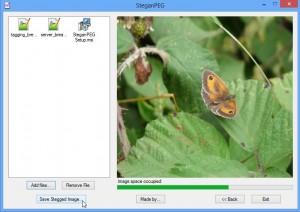 While it’s unlikely that the fate of your nation depends on it, there may be times when being able to pass on sensitive files to other people is a necessity. The obvious example is to encrypt those files in some way, either by storing them in a password-protected location or by encrypting them on the fly before passing them on.
While it’s unlikely that the fate of your nation depends on it, there may be times when being able to pass on sensitive files to other people is a necessity. The obvious example is to encrypt those files in some way, either by storing them in a password-protected location or by encrypting them on the fly before passing them on.
The problem with this approach is that it’s rather visible. Your encrypted files by their very nature advertise the fact they contain some form of sensitive data, attracting unwanted attention. So what can you do about it? The answer lies with steganography, and a free tool for Windows called SteganPEG 1.0.
Steganography has a long history, dating back to Ancient Greek times when it was the process of writing hidden messages in such a way as only the sender and intended recipient would know they existed. With the rise of computers, steganography has taken on a different slant, whereby information -- typically entire files -- are hidden away inside other files.
The key to making steganography effective is by drawing no attention whatsoever to the existence of the hidden file. That means the host file must appear to function completely normally, so opening it arouses no suspicion. One of the best ways of doing this is by hiding your files inside images, which open up like any other image, betraying no evidence of the files stashed away inside.
This is how SteganPEG functions -- once installed, fire up the program and you’ll immediately see it’s required for both creating the stenographic file and extracting the hidden files from it later, so your recipient will need their own copy. You also assign a password to your file, which is required in order to unlock its contents. It’s unlikely encryption is involved here, but as the key thing is to simply hide away the file, it’s not necessarily important, unless you’re peddling state secrets, of course.
Once assigned, pick your chosen JPEG image. When picking an image, make sure it’s not just large enough to store the files you wish to hide away inside, but also not too compressed. SteganPEG works by recompressing the original image to free up enough space for your files to reside in without increasing the size of the original image. This ensures it doesn’t stick out like a sore thumb, but it does mean you may have to try different images before you find one that has enough flexibility for hiding your chosen file or files.
 You can add multiple files to a single JPEG image so long as they won’t increase the size of the original file -- a progress bar handily tells you how much space you’ve got left to play with. Once complete, click the Save Stegged Image button to save a copy of the file.
You can add multiple files to a single JPEG image so long as they won’t increase the size of the original file -- a progress bar handily tells you how much space you’ve got left to play with. Once complete, click the Save Stegged Image button to save a copy of the file.
You can open this file like any other, then send it on to its intended recipient, who fires up their copy of SteganPEG, chooses "Read files from a JPEG image", supplies the password and then loads the file in. If all is well, they can then save the original files out of the image, all without hopefully arousing any suspicion whatsoever.
SteganPEG 1.0.0 is available now as a free, open-source download for PCs running Windows XP or later. XP and Vista users will also need .NET Framework 3.5 or later installed.

